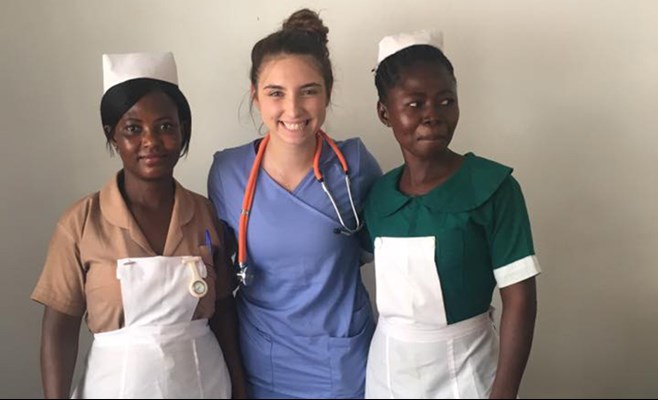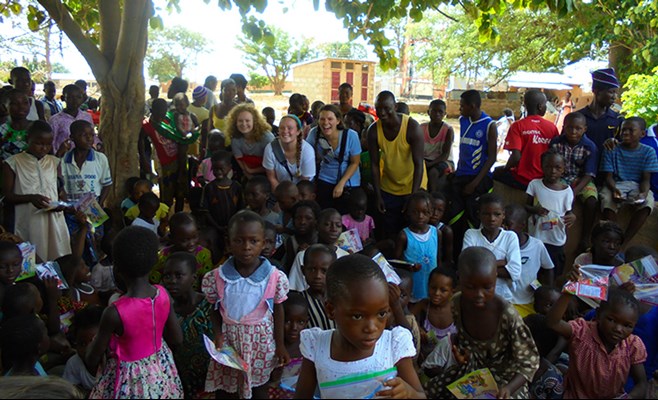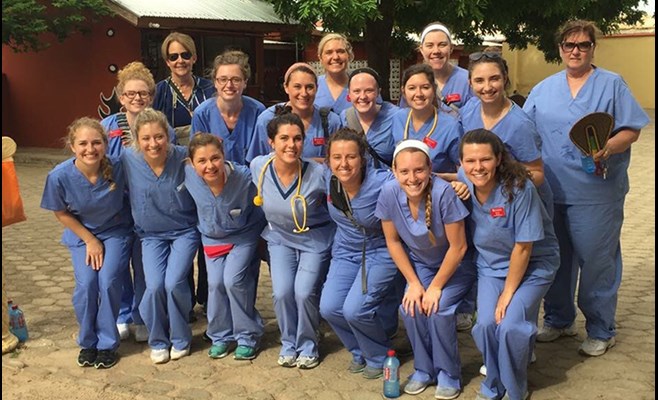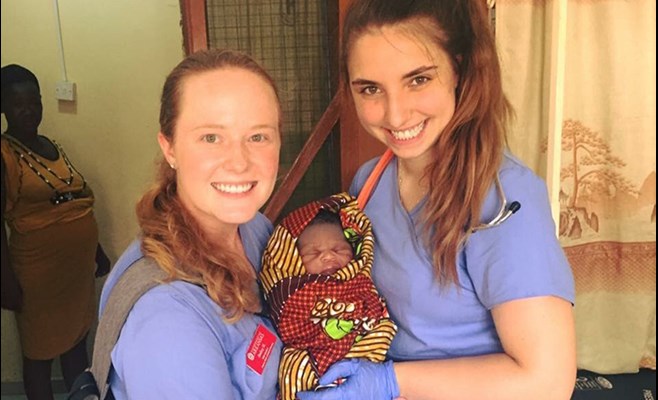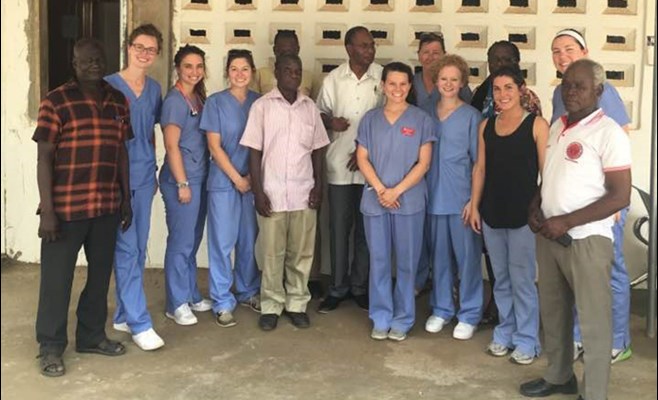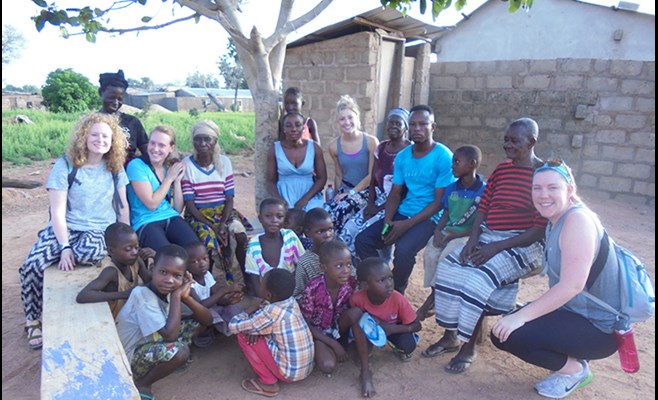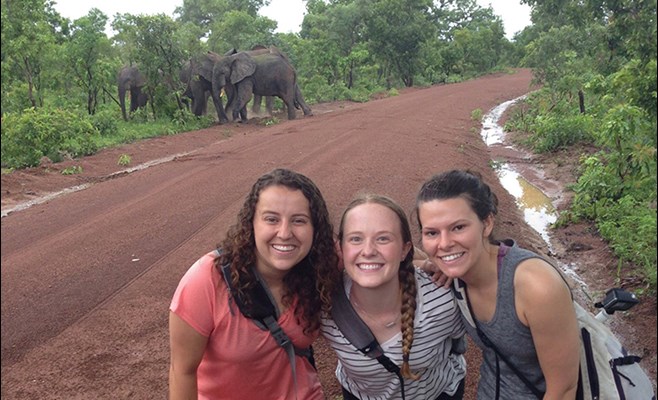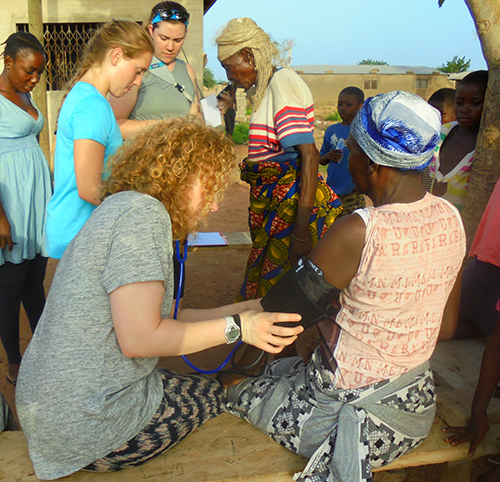Helping deliver babies, teaching about wound care, infant hydration and dental hygiene, teaching CPR, attending a Ghanian wedding and seeing elephants in the wild were all experiences University of Arkansas nursing students won't soon forget after spending more than three weeks in Africa last month.
Fifteen students in the Eleanor Mann School of Nursing took the trip to Ghana that showed their teachers they will make excellent nurses and that may shape the careers for some.
Carol Agana, instructor of nursing, planned and organized the trip. Allison Scott, assistant professor of nursing, was the other faculty member who went.
Agana has traveled many times over the past 10 years to Ghana in West Africa, where she has a home with her husband, John Agana, a Ghana native. That connection made the trip possible, the nursing instructor said, and she worked with local health-care providers and nonprofit organizations to set up learning opportunities for the students. The nursing school has recently begun arranging study abroad experiences for students, the first being last fall to Great Britain. Nursing students have also traveled to Sweden with the interdisciplinary program Health Teams Abroad.
"We can say with 100 percent confidence they all will be great nurses," Scott wrote in a Facebook post on a public group page the students set up to share details about their trip with family and friends. "We hope this experience has enriched their knowledge about another community and given them tools to use the rest of their education and career."
For Natalie Gohman, a senior who plans to graduate next May, the trip was also an opportunity to gather data for her honors thesis. She is studying perceived fall risk among older adults. With help from three other students and two interpreters, she visited people in the village of Zarre, using a fall risk assessment tool developed by the federal Centers for Disease Control and Prevention. She will complete the data collection in Fayetteville.
Gohman previously worked as a nursing assistant at a nursing home in Russellville where she grew up.
"They physically work more there (in Africa)," she said. "They are more active and are not eating a lot of processed foods so we didn't see a lot of health problems in general. Even people in their 70s and 80s were able to do the physical part of the assessment. They could stand on one foot as if they were a young person walking around our college campus. I was very impressed."
Gohman would like to work as a registered nurse in an emergency room after she graduates but she may pursue another degree later to become a physician assistant in surgery, and eventually she would like to work or volunteer overseas.
It took the group about 24 hours over three flights to get to Accra, the capital of Ghana, from which it was another 13 hours on a bus to the city of Bolgatanga, where they stayed but also traveled to villages within a 30-mile radius. The students received course credit for two classes while in Africa.
In Bolgatanga, the students worked in two clinics and hospitals learning about diagnosing and treating tropical diseases such as malaria, typhoid and yellow fever, caring for patients admitted to hospitals including adults, children and labor and delivery patients, providing wound care and interacting with Ghanian nursing students.
"We were not there to change things," Agana said. "We were going in to learn, especially about tropical diseases, and how the health-care system was similar to ours."
The students learned about differences in nursing education. One major difference was that, like in many third-world countries, midwives, rather than physicians, attend most births. Nurse practitioners are called medical assistants. There are two primary levels of nursing, registered nurses and community health nurses. In the United States, advanced practice nurses are more common, Agana said. Pre-travel meetings and coursework introduced the students to the African health-care system. The students also learned about chronic diseases, health disparities and techniques for assessing health in communities.
"We prepared them for going and talked to them about what they would see," Agana said.
From Bolgatanga, they traveled to villages to teach people about topics such as infant hydration and dental hygiene. Two students taught the Heimlich maneuver to use if someone is choking and hands-only CPR to staff at Amiah Hospital and some patients in the waiting room. Interpreters not only made it possible for the students to communicate, they also encouraged the locals to take part in demonstrations.
Health professionals in the country are making an effort to decrease infant mortality, Agana said, with dysentery and malaria posing dangers to babies and small children. If a child can make it to age 5, he or she has a good start, Agana said.
The students had many donations of supplies including baby bottles from COMOTOMO, Inc. to teach infant hydration. The electrolyte solution was donated by Johnson & Johnson. Students taught the importance of hydration, how to mix the solution and when to give the solution. They also brought wound-care kits to distribute to villagers and taught them about how to prevent infections.
Students also talked about safe sex and self-esteem with girls between 13 and 18 at the girls' high school in Bolgatanga. Others visited older villagers in their homes to talk with them about muscle-strengthening exercises and safety issues related to mobility.
Bailey Hutchens of Frisco, Texas, another senior planning to graduate in December, said the trip was different than she expected.
"I wanted to go to Ghana as a cultural experience as well as to learn a lot about the way they do things in the medical field," she said. "Originally, I thought I would be teaching them a lot of things, but I learned so much more from them than I could have taught them. You think you are going to a place where everyone is going to be so poor. I felt like I was the one who was poor. They were rich, rich in perseverance, courage and joy. It was amazing. That was a big takeaway for me."
Hutchens would like to work after graduation in a critical-care setting, specifically with children, but now would also like to work in third-world countries after she has gained more experience. She's considering a graduate degree to become a nurse practitioner.
Hutchens created the Facebook public group page that had nearly 200 members, allowing family, friends and colleagues to keep up with the students' activities on the trip. Several posts remarked on the nature of the people, who were described as very friendly, welcoming and kind.
Pictures and videos included teaching children to call the Hogs and a welcome dance by the Ghanaians, messages of encouragement from other nursing faculty members, and a bit of sightseeing — a slave trade post, crocodile pond and basket market.
"We all learned a lot about ourselves," Gohman said. "We've grown up in America, where our health-care system is one of the best. This area doesn't have that, yet we learned about different procedures and everyday tasks they do in a much simpler way using the resources they have. This was the takeaway from the trip: America's way is not the only way."
Topics
Contacts
Heidi S. Wells, director of communications
College of Education and Health Professions
479-575-3138,
